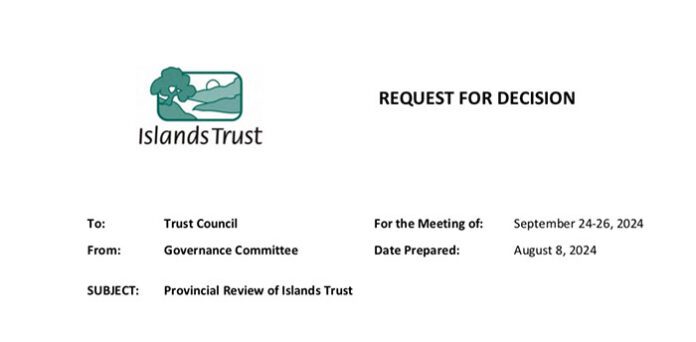Citing a “democracy deficit” and obstacles to meaningful reconciliation with First Nations, the Islands Trust will once again entreat the government of B.C. for a legislative review.
The Islands Trust Council (ITC) will request the Lieutenant Governor in Council to conduct a review of the “mandate, governance and structure” of the Islands Trust, via a letter spanning a range of issues it says need updates or clarification –– from authority over marine areas and funding models to the Section 3 “mandate,” proportional representation for residents and a decision-making process that includes the 27 Indigenous governing bodies with interests in the Trust area.
While a new review would be the first of significance since 1987, it’s not a new request, Salt Spring Island trustee Laura Patrick noted. In June 2022, virtually the same resolution was passed and communication sent, but just two months later the Minister of Municipal Affairs put on the brakes. With the Islands Trust’s own election period imminent, Patrick said, the ministry had expressed it wanted to wait to hear the “perspectives and opinions” any newly elected ITC might’ve had on the requested review.
“[Our] election was two years ago, folks,” said Patrick, who was among trustees who voted in favour of the action Wednesday, Sept. 25. “Now we have a provincial election in full swing –– and now is our opportunity to ask every candidate in our ridings how they will support a request to the province for review.”
Nearly all trustees seemed to favour requesting a review, although many felt the timing wasn’t right. Gabriola Island trustee Tobi Elliott was among several who urged ITC to consider advice from provincial Municipal Affairs staff, who in meetings with administrators had recommended any request wait until after the election, and have more specificity –– particularly with how legislation might be amended to better align with the 2019 Declaration on the Rights of Indigenous Peoples Act (DRIPA).
“We are made from pieces of the Local Government Act, the Community Charter, and of course the Islands Trust Act,” said Elliott. “All of these would need to shift to allow First Nations to have a much greater voice in governance and decision making.”
And Elliott felt more time was needed to engage with the First Nations leadership and community before starting conversations with the province, so any revisions could be received “in a good way, rather from a top-down imposed structure,” she said.
But most wanted to seize upon an opportunity seen right before a provincial election to put the issue under a political spotlight. Gambier Island Local Trust Area trustee Joe Bernardo said the intent was to “raise the stakes” for potential new representatives.
“This is where the rubber hits the road for the province on reconciliation,” said Bernardo. “They know this is a dangerous topic for them in the election, which is exactly why we need to get it out there and get it out there now.”
And Saturna Island trustee Lee Middleton took exception to the idea that trustees needed to have “all the answers” before approaching the province for help.
“If we had all the answers, we wouldn’t be having these conversations,” said Middleton. “We’re not experts.”
In her comments, acting CAO Julia Mobbs said the advice she received from provincial staff was that advancing the letter during the election period also risked the request being misplaced in the post-campaign shuffle. With no work advancing during the interregnum period, Mobbs said she was warned any correspondence was going to “sit in a pile.”
“When a new government is formed post-election, all of that information will then be advanced,” she said, “and our letter could potentially be lost.”
But most trustees were unconvinced.
“We need to project a political vision that can excite a [new] minister,” said Middleton.
Bernardo agreed, calling the issue a political “hot potato,” and said trying to craft specific legal language at the ITC level was “playing the province’s game.”
“The Minister didn’t meet with us and fobbed it off on staff for a reason,” said Bernardo. “They don’t want to get their hands scalded.”
Galiano Island trustee Ben Mabberley said any meaningful co-management structure involving First Nations will require significant legislative change –– and a real desire to enact it; the Islands Trust has said much about reconciliation, he added, despite never having First Nations “at the table with power sharing agreements.”
“So, you have to decide amongst yourselves, are you willing to share power?” said Mabberley. “Because if you’re not, fine, but don’t have long conversations around the room about how reconciliation is the number one goal.”
After the vote, trustees clarified the intent was to get the letter out as soon as reasonably possible, which will likely mean in advance of a communication strategy being fully developed for the public and press.
“We’re going to wing it [with the media], quite honestly,” said ITC chair Peter Luckham.

